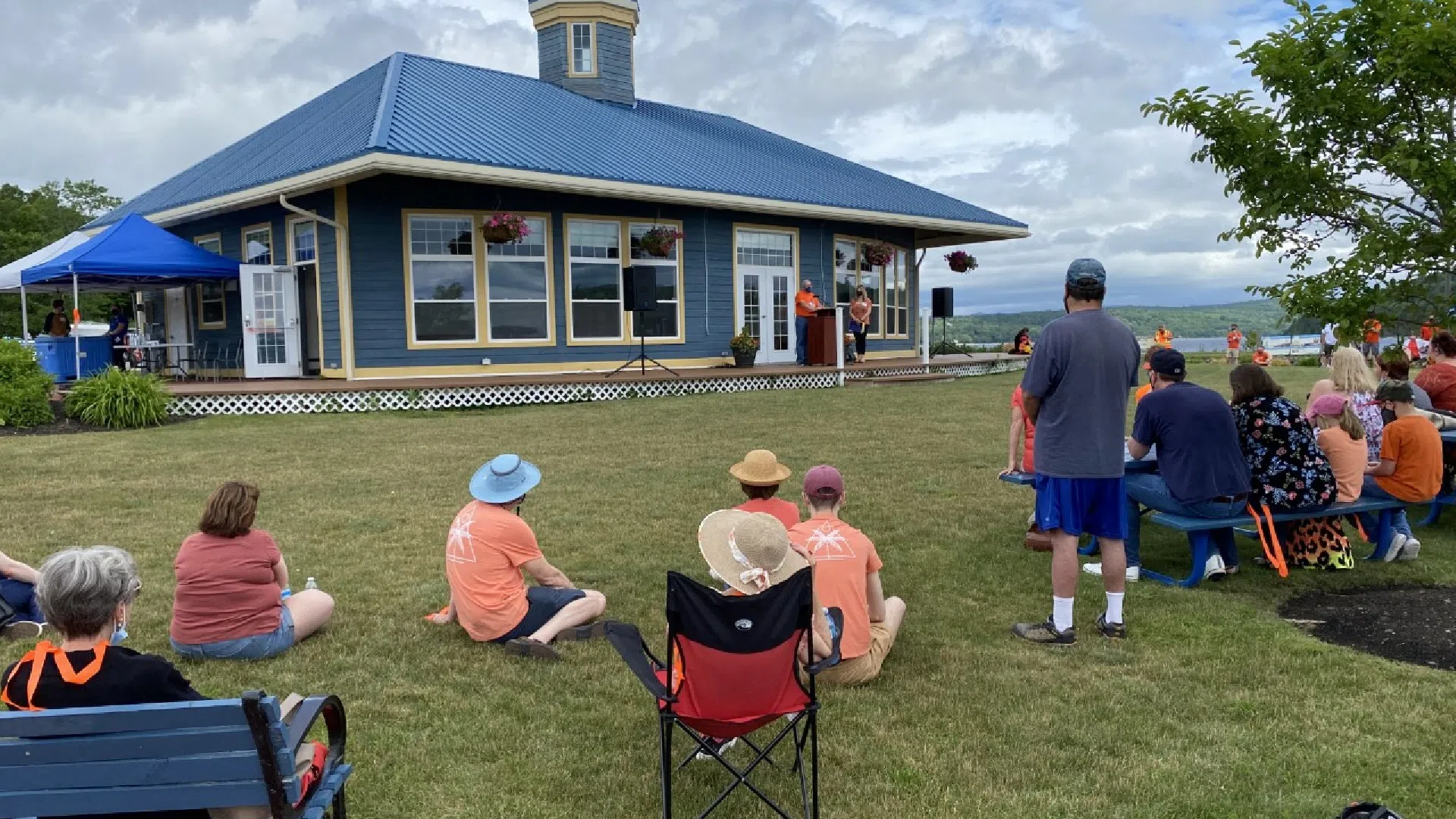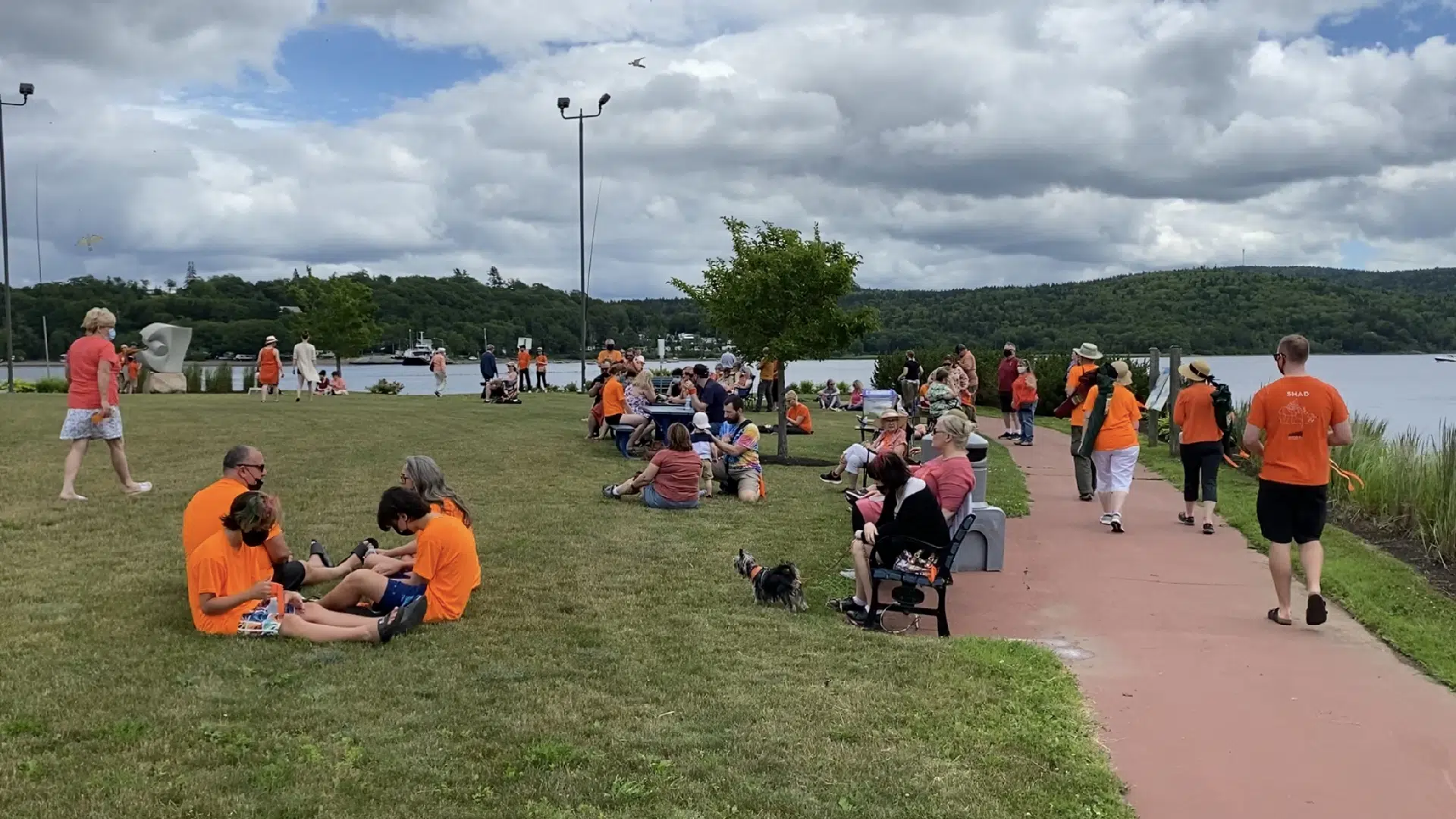A poignant gathering took place in Grand Bay-Westfield on Thursday in place of traditional July 1 celebrations.
More than 200 people gathered at the Brundage Point River Centre during the noon hour for a time of reflection and solidarity.
It followed the recent discoveries of hundreds of unmarked graves at former residential school sites across Canada in recent weeks.
Organizers also invited Gary Gould of the Wolastoqey Nation to attend and share some history of the Wolastoqey in the Grand Bay-Westfield area.
“We’ve reached a point in our mutual history as a country and a province where we can no longer ask if reconciliation is possible but how is reconciliation possible,” Gould told those in attendance.
Gould said reconciliation is a critical, complex, multi-faceted and continuous process that is the responsibility of every single Canadian.
It involves acknowledging and respecting Indigenous rights, land claims and titles, honouring treaties, and ensuring history never repeats itself, he said.
“It’s not a trend. It’s not a single gesture, action or statement. It’s not a box to be ticked off on some government form that says I attended a conference or an assembly and listened to an Aboriginal spokesperson about their rights and the residential schools and history,” said Gould.

Gary Gould shares some history of the Wolastoqey during a community gathering in Grand Bay-Westfield on July 1, 2021. (Image: Brad Perry)
Gould said some people that Grand Bay-Westfield has recognized as being symbolic historical figures were involved in some of the atrocities committed against Indigenous Peoples in the past.
That includes Gen. John Coffin, one of the first commissioners and later the superintendent of the Sussex Vale Indian School, which existed from 1787 until 1826.
Coffin was the architect of the indenture program at the school, where were sent to Loyalist farmers in the lower Saint John River Valley to work as labourers. The program was the model that the government later used for its residential schools, said Gould.
Gould said many people are shocked to learn that New Brunswick had schools for Indigenous children and that they existed for 40 years.
“When you’ve got skeletons in your closet, you don’t like talking about it. Not many Loyalists wanted to admit that maybe their great-great-grandfather had Indian-indentured servants in their farms and that these people were basically slaves,” he said.
“We’ve got to pull the scab off the blemish, lance the boil, and be honest with one another and say here’s the real history, here’s what happened.”
Learning the true history of Indigenous Peoples and the suffering they have gone through is the only way to have true reconciliation, said Gould.
He said he hopes those who attended Thursday’s gathering were there for true reconciliation and not out of guilt about the recent discoveries at former residential school sites.
Dozens have turned out in Grand Bay-Westfield this morning for a community gathering.
Gary Gould of the Wolastoqey Nation will be on hand to share some of the history of the Wolastoqey in the area. pic.twitter.com/qLVgFjOeBw
— Brad Perry (@BradMPerry) July 1, 2021
Mayor Brittany Merrifield said she was glad to see the turnout at the gathering, which was organized in a matter of days.
“It was a very humbling experience to see this many people come out to listen to the truth of our First Nations here in the area and across the nation. It was a heartfelt response from everyone that was here,” said Merrifield.
The town has taken several steps in recent weeks to better understand Indigenous issues and move toward reconciliation, such as adopting five of the six Calls to Action from the Truth and Reconciliation Commission that are applicable to municipalities.
One of those actions deals with educating public servants on the history of Indigenous Peoples, which the town hopes to implement as soon as possible.
In addition, two streets with historical Indigenous names — Woolastook Drive and Nerepis Road — will now have street signage in the Maliseet language.
But Gould cautioned that has the potential of being seen as nothing more than tokenism unless the town continues on its journey toward reconciliation.
“I think in more and more of their public events, they need to recognize the Wolastoqey, the people of the Wolastoqey, and that there’s unfinished business based on Aboriginal and treaty rights and that there are people who live in the village,” he said.
A National Indian Residential School Crisis Line has been set up to provide support for former residential school students. The toll-free line can be accessed 24 hours a day, seven days a week by calling 1-866-925-4419.








